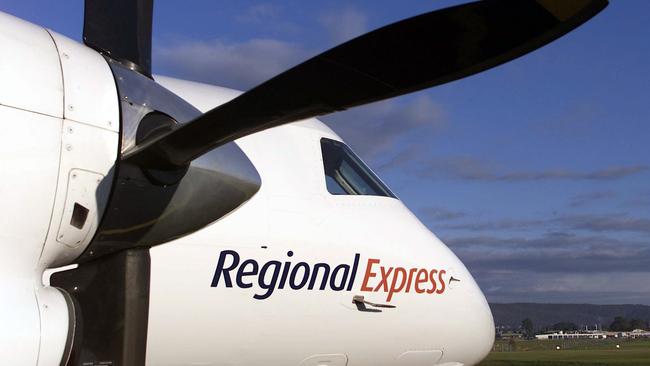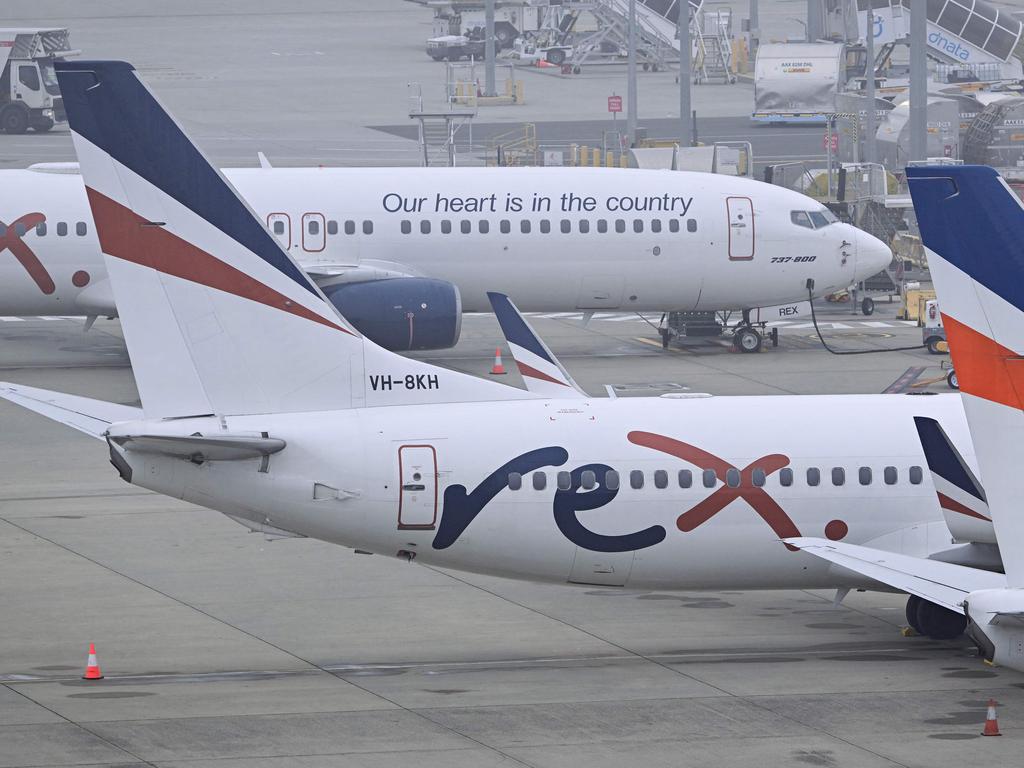Rex administrator EY upbeat about airline’s future as interested parties line up
Rex administrators say there’s already strong interest to buy the airline as debate rages over the government’s role in fostering competition among carriers.
Asian investment firm PAG is likely to face stiff competition for failed airline Rex, with administrators revealing they are already being inundated with emails from interested parties before officially calling for expressions of interest.
EY was appointed voluntary administrators to Rex on Tuesday, two months after being asked to conduct a business review of the struggling airline.
Although Rex’s regional flights were continuing, jet operations on major city routes launched mid-pandemic had been “permanently grounded” and 360 staff “let go”.
EY partner Sam Freeman said the sale process was yet to begin, but administrators were collecting “a database of parties that are reaching out”.
“We haven’t even commenced any advertising program yet so our thoughts that there will be interest (in buying Rex) seem to be stacking up,” Mr Freeman said.
Investor PAG, which was owed about $150m by Rex, was confirmed as the source of loan funding to keep regional flights going throughout the administration.
As reported by The Australian’s DataRoom on Wednesday, PAG was considered to be angling to buy the carrier. PAG helped to finance Rex’s ill-fated jet operations.
Documents lodged with the Australian Securities & Investments Commission showed PAG’s representative on the Rex board, Lincoln Pan, took the lead on the review process, with EY attending 17 of 20 meetings since May 9.
Virgin Australia’s chief transformation and strategy officer, Alistair Hartley, also met with Rex and EY on July 9 to discuss options being examined to keep the smaller airline operating.
Mr Freeman said PAG had its r own advisers, and what it ultimately decided to do would play out in coming weeks.
“They’ve got a number of options available to them, but the level of interest in the regional business suggests that there will be others who’ll be wanting a position as well,” he said.
He rejected the suggestion that any buyer of Rex would be facing significant capital expenditure to repair and renew the airline’s fleet of ageing Saab 340s.

Currently, 25 of the 57 aircraft were parked at various airports, including Wagga Wagga and Adelaide, awaiting parts including engines and other maintenance.
“I’m told when you compare (the Saab fleet) to some of the majors it’s actually a younger fleet on average and half the fleet hasn’t even reached midlife,” Mr Freeman said.
The average age of the Saabs, which are no longer in production, is 30.1 years. QantasLink’s fleet has an average age of 19.8 years, while Virgin Australia Regional Airlines’ average is 21.1 years.
Nevertheless, Mr Freeman said the fleet was capable of flying all the routes serviced by Rex, which he said had the lowest cancellation rate in the country, and dispatch reliability of 98.5 per cent.
“The people that walk into this operation, the successful party, will have the fleet that they need to operate the business and they can make changes as they see fit, but they’re not walking in instantly needing to spend a lot of money,” Mr Freeman said.
He confirmed that 360 employees attached to the “permanently grounded” 737 operation had been let go in a “tough day”, and talks were continuing with about 250 others.
Those who had left faced a wait to be paid their entitlements, which Mr Freeman said would be dealt with either through a deed of company arrangement or the federal government’s fair entitlements guarantee.
Employees who remained with Rex would be paid for “every day they worked in the administration period”, he added. “No one has been stood down without pay or anything like that.”
As the process rolled on, debate raged about whether the domestic market could support a third airline in the wake of the Bonza and Rex failures.
Former competition watchdog Rod Sims said the airline collapses were the result of inept public policy that “baked in a duopoly” of Qantas and Virgin Australia.
“It seems that perhaps the government thinks it’s easier to run things with just the two airline groups, which means we forgo lower fares,” Professor Sims said.
He singled out slot reform at Sydney airport as a factor that could allow more airlines to compete with Qantas and Virgin Australia. He said that, despite the government announcing in February that it would reform the slot management at the airport, no action had been taken.
“So let’s fix the slot system and then let’s see if we can get a third player,” he said.
Slots were the time windows allotted to airlines for flights in and out of Australia’s biggest gateway, and were managed by Airport Coordination Australia – a company controlled by Qantas, Virgin Australia, the Regional Aviation Association and Sydney Airport.
Transport Minister Catherine King said work was under way to implement slot reforms but suggested there were other reasons Rex had failed.
“Aviation is challenging. It’s got a lot of capital costs in it. It’s got a lot of workforce costs in it as well,” Ms King said. “And it’s not just here in Australia that we see aviation struggle.”
More Coverage
Originally published as Rex administrator EY upbeat about airline’s future as interested parties line up





